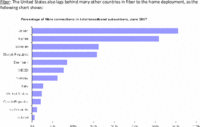 A musician warns us about novelty being used to subvert participation,
and comes up with a clever analogy:
A musician warns us about novelty being used to subvert participation,
and comes up with a clever analogy:
We hate when things are taken from us (so we rage at censorship), but we also love to get new things. And the providers are chomping at the bit to offer them to us: new high-bandwidth treats like superfast high-definition video and quick movie downloads. They can make it sound great: newer, bigger, faster, better! But the new fast lanes they propose will be theirs to control and exploit and sell access to, without the level playing field that common carriage built into today’s network.Yep, and the cablecos and telcos have not been shy about saying that’s what they want to do.They won’t be blocking anything per se — we’ll never know what we’re not getting — they’ll just be leapfrogging today’s technology with a new, higher-bandwidth network where they get to be the gatekeepers and toll collectors. The superlative new video on offer will be available from (surprise, surprise) them, or companies who’ve paid them for the privilege of access to their customers. If this model sounds familiar, that’s because it is. It’s how cable TV operates.
— Beware the New New Thing, By DAMIAN KULASH Jr., Op-Ed Contributor, New York Times, Published: April 5, 2008
Here’s the new analogy: Continue reading






